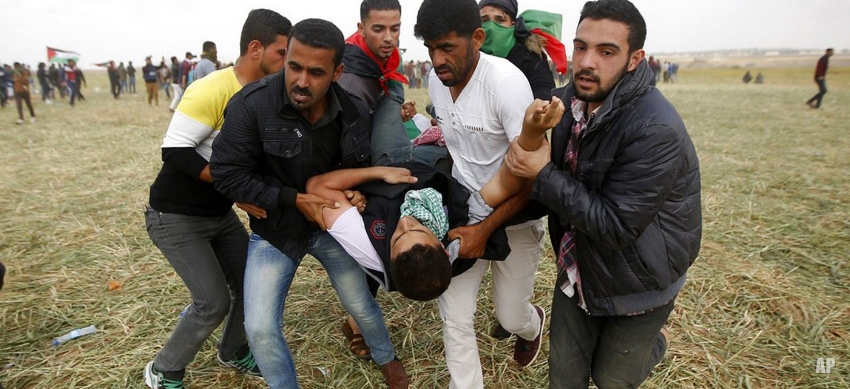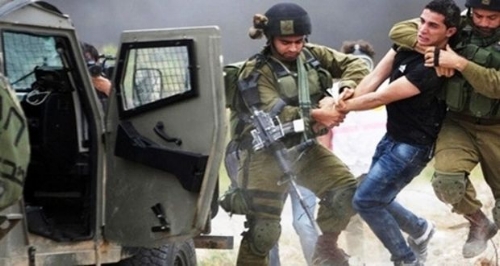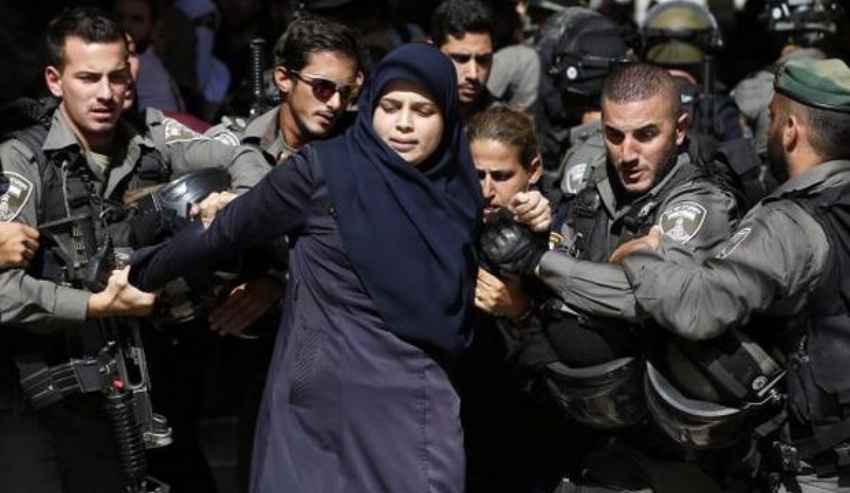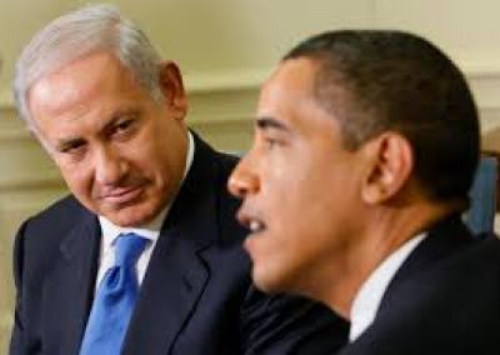Leahy Law would cut aid to Israel, but no one wants to enforce it
by Kathryn Shihadah
(This article originally appeared in If Americans Knew)
The Leahy Laws were designed to uphold human rights in countries that receive United States aid. These laws enable the US to withhold military assistance from units and individuals in foreign security forces if they have committed a gross violation of human rights (GVHR).
The laws – one for the State Department and a similar one for the Department of Defense – are implemented through a vetting process based on annual Department of State Country Reports on Human Rights, reports from reliable NGOs, and other sources. According to principal sponsor Senator Leahy (D-VT), the legislation “makes it clear that when credible evidence of human rights violations exists, US aid must stop.”
GVHRs (Gross Violations of Human Rights) that can trigger Leahy
extrajudicial killing
torture or cruel, inhuman, or degrading treatment or punishment
prolonged detention without charges and trial
causing the disappearance of persons by the abduction and clandestine detention of those persons
other flagrant denial of the right to life, liberty, or the security of person
politically motivated rape
Since its founding in 1948, Israel has received nearly $125 billion in aid from the US; the current rate amounts to over $10 million a day. Is anyone keeping an eye on the recipient of 50% of our total foreign military aid? The answer is a resounding Yes.
Dozens of NGOs monitor and report on Israel’s actions; our State Department has generated a Country Report on Human Rights every year since 1976. If Israel is regularly committing GVHRs, it is easily verifiable.
An observer from the Temporary International Presence in Hebron videotapes clashes between Palestinians and Israeli troops November 7, 2000 in the marketplace in the West Bank town of Hebron.
The Great March of Freedom
The border between occupied Gaza and Israel is the site of a 6-week mass protest which started on March 30th and is planned to last till May 15th, 2018. The event, called the Great March of Freedom, recalls several important events in Palestinian history.
March 30th is Land Day, when Palestinians commemorate that moment in 1976 in which Israel institutionalized the theft of Palestinian land, the day that Israeli forces killed 6 peaceful protesters.
May 15th is Independence Day in Israel, but for Palestinians it is Nakba Day, commemorating the “catastrophe” in which Israel took over 78% of their land in 1948 and sent 800,000 Palestinians into exile. Within months, the United Nations passed a resolution guaranteeing them the right of return to their land and homes.
Tens of thousands of Palestinians in Gaza – 70% of whom are refugees from 1948 or their descendants – have been gathering nonviolently to protest the occupation and blockade of their land, and to demand the right of return.
Israeli forces have responded to unarmed Palestinians with snipers and live fire, killing at least 32 and injuring over 2,870 in the first 3 weeks of the Great March.
Most of the world has condemned Israel’s actions from the start, as it did for many Israeli incursions into Palestinian territory which resulted in massive casualties. In fact most of the world has criticized Israel for consistently for years. Pro-Israel NGO UN Watch has been tracking global censure of Israel in the United Nations since 1993 with the stated goal of “monitor[ing] the performance of the UN by the yardstick of its own Charter” and the unspoken objective of proving that the UN has an anti-Israel bias. The organization reports:
UN Human Rights Council: From its creation in June 2006 through June 2016, 68 out of 135 resolutions (over 50%) have been against Israe
UNESCO: Each year, this body adopts around 10 resolutions a year criticizing only Israel (UNESCO does not criticize any other UN member state in a country-specific resolution – except Syria once in 2013)
UN Nations General Assembly: From 2012 through 2015, 83 out of 97 resolutions (86%) have been against Israel
Although Israel is a signatory of the Geneva Conventions, it has also chosen to disregard parts of this international treaty as well.
In spite of worldwide outcry, and with the Leahy Laws on the books for years, American military aid to Israel has increased year after year. American politicians apparently don’t find Israel’s actions worthy of reprimand.
Israeli snipers seen on the border with Gaza during the Great March of Return, March 30, 2018.
Human Rights
Israel regularly uses a broad definition of “terrorist” to excuse human rights abuses against Palestinians. When soldiers shot a boy in the face, they explained that he was climbing the wall around their compound – he might have been a terrorist. When they detained a 3-year-old child who was running toward them with a zucchini scraper – they pointed out that he might be booby-trapped. When 2 million people are denied medicine and food for 10 years, it is easily rationalized: they support Hamas, which shoots rockets into Israel. In Defense Minister Avigdor Lieberman’s words, “There are no innocent people in the Gaza Strip.”
And now: killing and injuring unarmed, nonviolent protesters is justifiable because Israel’s border is sacred and must not be approached, let alone compromised. “The border fence between Israel and the Gaza Strip separates a sovereign state and a terrorist organization.”
Israel justifies the use of lethal force against peaceful protesters – and decades of other illegal or questionable actions – so effectively that American politicians remain unwavering in their loyalty. American taxpayers need to judge the virtue of the Israeli rationale on the basis of hard facts. Set Israel’s actions next to the Leahy list of gross violations of human rights, and it becomes clear that it time for the Leahy Laws to be enforced. It is past time.
Palestinian protesters evacuate a wounded youth during clashes with Israeli troops along the Gaza Strip border
Extrajudicial killing
International law restricts the lethal use of firearms to a last resort; however, Israeli officials have repeatedly contravened this standard in public statements.
After the first weekend of the Great March, army spokespeople indicated that all of the Palestinians killed had been taking violent action or tampering with the border fence, and at least 10 of the victims were members of Hamas. They were all executed without trial.
On the second weekend of the March, Gazan journalist Yasser Murtaja, who was lethally shot while wearing a clearly marked “PRESS” vest, was rebuffed by Defense Minister Avigdor Lieberman as a “Hamas terrorist.” No evidence was produced. The U.S. State Department had vetted him and he was set to receive funds from USAID. Murtaja was executed without trial.
These were not aberrant killings by rogue soldiers: Israeli leaders regularly encourage extrajudicial killing and excessive force.
Transportation Minister Yisrael Katz stated in 2016, that “we cannot let attackers remain alive, risking the lives of Jews.”
And Avigdor Lieberman, who is now defense minister, advocated in a 2015 Facebook post for a policy in which “no attacker, male or female, should make it out of any attack alive.”
Also in 2015, Israeli Police Minister Gilad Erdan declared that “if a terrorist has a knife or screwdriver in his hand, you should shoot to kill him without thinking twice.” He added, “every attacker who sets out to inflict harm should know that he will likely not survive the attack.”
In 2015, Jerusalem Police District Commander Moshe Edri stated that “Everyone who stabs Jews or harms innocent people – should be killed.”
Defense for Children International-Palestine reports that 2015 saw Israeli forces execute at least 28 Palestinian children alone, thanks in part to the environment created by its leaders and a broad shoot-to-kill policy.
Amnesty International has also been tracking Israel’s extrajudicial killings for years.
The Leahy Laws remain untouched.
Torture
Torture or cruel, inhuman, or degrading treatment or punishment is another Leahy trigger. In international law, torture is forbidden; in Israeli law, a small window called “extraordinary circumstances” has enabled authorities to make abundant use of the practice.
Palestinians have registered least 1,000 complaints of torture since 2000, but this year – 2018 – is the first time one has led to a criminal investigation. The rest were summarily dismissed.
Abdel Nasser Farwana, head of the Palestinian Detainees and Ex-Detainees Committee Studies and Documentation Unit, reports that 71 Palestinian prisoners have died from torture since 1967, and dozens of others have died shortly after release. Farwana adds, “Israel…is the only country in the world that legalizes torture in its jails and detention camps and protects its perpetrators. Israel uses torture on institutional level against Palestinian and Arab detainees.”
A report in Foreign Service Journal reported that Israeli torture has also extended at times to American citizens.
The Leahy Law should have kicked in years ago, cutting off aid to Israel’s prison establishment.
Israeli soldiers claimed this boy would have stabbed an Israeli. August 2015
Prolonged detention without charges and trial
Administrative detention is a process meant only for rare cases: for a detainee who has not committed an offense, on the grounds that s/he plans to break the law at some future time. The detainee is not charged and does not stand trial. Like torture, administrative detention is overused in Israel.
In a recent report, Addameer reveals that during the first 2 months of 2018, Israeli forces had already detained 1319 Palestinians, including 274 children, 23 women, and 4 journalists. Since 2000, Israel has detained at least 12,000 children alone.
Addameer crunched the numbers and found that since 1967, more than 800,000 Palestinians have been detained. This amounts to approximately 20% of the total Palestinian population in the occupied Palestinian territories, and upwards of 40% of the total male Palestinian population. Approximately 10,000 women have been detained since 2000.
While international law permits detention without trial under extremely limited, emergency circumstances, critics argue that Israel has exploited the measure, instituting it on a massive scale, and denying detainees due process.
Ultimately, about 95% of detainees are released without charge or trial.
B’tselem summarizes the practice:
“The power to incarcerate people who have not been convicted or even charged with anything for lengthy periods of time, based on secret “evidence” that they cannot challenge, is an extreme power. Israel uses it continuously and extensively, routinely holding hundreds of Palestinians at any given moment…Israel also exploits this measure to detain Palestinians for their political opinions and for engaging in non-violent political activity.”
How many more years does Israel need to misappropriate administrative detention before the Leahy Law is activated?
Abduction and clandestine detention
The Women’s Centre for Legal Aid and Counselling (WCLAC), a Palestinian NGO, estimates that the Israeli military conducts nearly 1,400 night raids per year (in addition to daytime operations) – over 65,000 since 1967.
These raids have been heavily criticized by human rights organizations as especially damaging to children. Usually conducted around 2 am, they start with loud banging on the door or an explosion to blast the door open. Homes are ransacked, family members threatened, and children often see a parent abducted – or are abducted themselves during these raids.
On one night in August 2017, 15 Palestinians were detained in a single raid in East Jerusalem; 160 were arrested in 12 days in July 2017, 30 of them minors.
Politically motivated rape
Actual rape has been reported in Israeli prisons: in 2005, doctors verified the violent abuse of a Lebanese prisoner by an Israeli interrogator; counselors have witnessed confidential descriptions from Palestinian women of rape by Israeli soldiers. Rasmea Odeh has publicly discussed horrific torture and rape.
While the subject of rape is socially taboo in Palestine and statistics are impossible to gather, it is important to note that the United Nations Istanbul Protocol states that “verbal sexual threats, abuse and mocking are also part of sexual torture.” In the Palestinian culture, threats of a sexual nature are a very serious matter, and are globally they are considered to be a form of torture.
According to a 2017 report from Addameer, the practices of sexual harassment, threats of rape (directed at themselves and family members), sexually degrading insults, and strip and body searching of female prisoners are “common and systematic.”
Male prisoners have been somewhat more willing to speak up on the subject. Israeli clinical psychologist Daniel J.N. Weishut published a report in 2015 which reveals that “Israeli authorities are systemically involved with torture and ill-treatment of a sexual nature.”
He also notes that while dozens of cases have come up, no convictions have been returned; in all but one case, the complaints were rejected by the authorities.
In 2010, a study by Defense for Children International-Palestine led to the conclusion that “sexual harassment and sexual abuse” have been used across the board in the interrogation of child prisoners.
Other flagrant denial of the right to life, liberty, or the security of person
Statistics on punitive demolitions of Palestinian homes are easy to find; as are reports on the demolitions of entire villages, destruction of crops, collective punishment, and unnecessary delays at checkpoints even for medical emergencies. The list is long.
This is in addition to the ongoing theft of land and resources, the ongoing blockade of Gaza and occupation of both Gaza and the West Bank, and other human rights abuses.
Accountability
Implementing the Leahy Law, the U.S. government vets foreign security forces to ensure that aid recipients have not committed gross human rights abuses, and engages with governments to promote accountability and measures to prevent future abuses.
The purpose of the Leahy Law is to hold states accountable for their actions. Israel considers itself immune from accountability, all the while collecting over $10 million a day in military aid from the United States. The Jewish State makes little attempt to hide its human rights abuses.
Even before the Great March of Return began, Israeli rhetoric and actions pointed to a massacre. Prime Minister Netanyahu employed at least 100 snipers, with orders to shoot anyone trying to breach the border fence. Senior IDF officers were quoted as saying that they were perfectly willing to produce a high body count: it was a “price [Israel] would be willing to pay to prevent a breach” of the border fence.
After the first weekend of the Gaza Great March of Return, condemnation came from (almost) all sides and calls for investigation from both the UN secretary-general and the EU chief of foreign policy. Israel’s Defense Minister Avigdor Lieberman would have none of it: “Israeli soldiers did what was necessary. I think all our soldiers deserve a medal.” He added, “As for a commission of inquiry – there won’t be one.”
In fact, quite the opposite was true. Major General Yoav Mordechai, Coordinator of Government Activities in the Territories, called on the World Health Organization (WHO) to restrain Gazans who planned to burn tires during the second weekend of protest. Mordechai insisted that it was “irresponsible behavior” that would cause “unprecedented air pollution.
This is part of an ongoing pattern of blatant refusal of accountability.
In 2016, after being denied entrance to the occupied Palestinian territories for 18 months, UN rapporteur for human rights Makarim Wibisono gave up and resigned his position. Israel’s foreign ministry spokesman explained the refusal: “Israeli human rights are violated too, every day, by Palestinians, and until this ends the council will not be taken seriously as a body that respects human rights.”
In 2016, 10 Congress people – one of which was Senator Leahy – sent a letter to Secretary of State John Kerry, urging him to investigate extrajudicial killings and other possible GVHRs in Israel, and recommending application of the Leahy Law.
When Netanyahu got wind of the letter, his response was swift and decisive:
“The IDF and Israeli police do not engage in executions. Israel’s soldiers and police officers defend themselves and innocent civilians with the highest moral standards against bloodthirsty terrorists who come to murder them.”
An IDF soldier is seen seconds before shooting a wounded Palestinian man in the head. (Screenshot/B’Tselem)
The Prime Minister was apparently comfortable making this statement, in spite of the fact that a week earlier, Israeli soldier Elor Azaria had been caught on video shooting a Palestinian man in the head at zero range, as the man lay wounded and unarmed on the ground. (Netanyahu later called for pardon for Azaria, stating that there had already been enough pain “first and foremost for Elor and his family, IDF soldiers, and many citizens and parents of our soldiers, myself included.”)
The viral video notwithstanding, Netanyahu also called Secretary Kerry and insisted that he go on record declaring that Israel is not guilty of extrajudicial assassinations.
All of this was in the context of Netanyahu’s panhandling to increase military aid from the United States to $4.5 billion a year.
In 2011, then Israeli Defense Minister Ehud Barak literally got away with murder when the Leahy Law came under discussion. Barak explained to Senator Leahy, “the difference between Israel and terror groups or other countries in the Middle East is that we give an accounting and there is monitoring.”
He also reminded the senator that Palestinians who feel they have been wronged are welcome to approach the High Court of Justice. According to B’tselem, this judicial body routinely refuses to grant any semblance of justice to Palestinians.
The vast majority of US politicians are enablers of Israel in its crimes.
In 2015, Israel launched an attack on Gaza, “Operation Protective Edge,” in which over 2,000 Palestinians died and 10,000 were injured (71 Israelis were killed and 1,300 were injured). Rather than censuring Netanyahu for this ferocious attack, President Obama agreed to sell Israel $1.9 billion in arms – this in addition to the extra munitions Israel helped itself to when running low on mortar rounds and grenades just 2 weeks into that incursion.
A Pentagon spokesman commented on Palestinian casualties: “The high civilian death toll makes clear that Israel can and must do more to meet its own high standards for protecting civilians from being killed.”
The spokesman was quick to state America’s eternal support for “Israel’s right to defend itself.”
While turning a blind eye to its own human rights abuses, Israel takes up the gauntlet against Palestinians when it comes to any resistance, even when it is nonviolent. The Gaza Great March of Return is regularly recast as a “violent movement” or a “cover for terrorism”; the BDS movement is “an existential threat to the existence of the state.”
Meanwhile, up on the Hill
The Leahy Laws allow for waivers: if a country fails the vetting process, State Department may call for an exception if the foreign government “has taken all necessary corrective steps,” or in the event of “humanitarian or national security emergencies.” DOD can also waive the prohibition on funding in “extraordinary circumstances”; in such cases, the Secretary of Defense is required by law to report to Congress the nature of the GVHR as well as the “circumstances that necessitate the waiver.”
But with all the human rights violations going on in Israel-Palestine even today, the Leahy law sits on the shelf.
Our Congress people (with a few notable exceptions) drink the Koolaid, take the campaign donations from AIPAC and other lobbies,, and sign the checks. If they have read the annual Department of State Country Reports on Human Rights, or the multitude of human rights reports from nongovernmental organizations, there has been no impact. To understand why, read They Dare to Speak Out or The Israel Lobby, (shorter version here).
On the contrary, Congress has pushed through the Taylor Force Act, which is harmful to Palestinians; both houses are currently entertaining anti-BDS laws –the House version contains strong wording that opposes a United Nations Human Rights Council resolution.
When the TV cameras are rolling, or the lobbyists are outside the door (read: all the time), it would appear that our Congressional representatives do not really believe in human rights after all – at least when those humans are Palestinian.
Kathryn Shihadah is a staff writer for If Americans Knew








